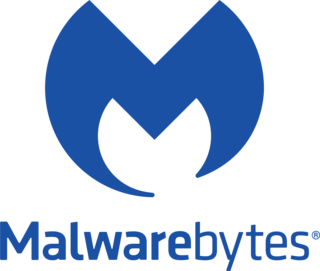Related Research Articles

Antivirus software, also known as anti-malware, is a computer program used to prevent, detect, and remove malware.

ESET, s.r.o., is a software company specializing in cybersecurity. ESET's security products are made in Europe and provide security software in over 200 countries and territories worldwide. Its software is localized into more than 30 languages.
Xcitium, formerly known as Comodo Security Solutions, Inc., is a cybersecurity company headquartered in Bloomfield, New Jersey.
In computer security, coordinated vulnerability disclosure is a vulnerability disclosure model in which a vulnerability or an issue is disclosed to the public only after the responsible parties have been allowed sufficient time to patch or remedy the vulnerability or issue. This coordination distinguishes the CVD model from the "full disclosure" model.
The various versions of Microsoft's desktop operating system, Windows, have received various criticisms since Microsoft's inception.

VirusTotal is a website created by the Spanish security company Hispasec Sistemas. Launched in June 2004, it was acquired by Google in September 2012. The company's ownership switched in January 2018 to Chronicle, a subsidiary of Google.
A zero-day is a vulnerability or security hole in a computer system unknown to its owners, developers or anyone capable of mitigating it. Until the vulnerability is remedied, threat actors can exploit it in a zero-day exploit, or zero-day attack.
The Pwnie Awards recognize both excellence and incompetence in the field of information security. Winners are selected by a committee of security industry professionals from nominations collected from the information security community. Nominees are announced yearly at Summercon, and the awards themselves are presented at the Black Hat Security Conference.

Malwarebytes is anti-malware software for Microsoft Windows, macOS, ChromeOS, Android, and iOS that finds and removes malware. Made by Malwarebytes Corporation, it was first released in January 2006. This is available in a free version, which scans for and removes malware when started manually, and a paid version, which additionally provides scheduled scans, real-time protection and a flash-memory scanner.

Kaspersky Lab is a Russian multinational cybersecurity and anti-virus provider headquartered in Moscow, Russia, and operated by a holding company in the United Kingdom. It was founded in 1997 by Eugene Kaspersky, Natalya Kaspersky and Alexey De-Monderik. Kaspersky Lab develops and sells antivirus, internet security, password management, endpoint security, and other cybersecurity products and services.
Pwn2Own is a computer hacking contest held annually at the CanSecWest security conference. First held in April 2007 in Vancouver, the contest is now held twice a year, most recently in March 2024. Contestants are challenged to exploit widely used software and mobile devices with previously unknown vulnerabilities. Winners of the contest receive the device that they exploited and a cash prize. The Pwn2Own contest serves to demonstrate the vulnerability of devices and software in widespread use while also providing a checkpoint on the progress made in security since the previous year.
Avira Operations GmbH & Co. KG is a German multinational computer security software company mainly known for its Avira Free Security antivirus software. Although founded in 2006, the Avira antivirus application has been under active development since 1986 through its predecessor company H+BEDV Datentechnik GmbH. Since 2021, Avira has been owned by American software company NortonLifeLock, which also operates Norton, Avast and AVG. It was previously owned by investment firm Investcorp.
Grammarly is a Ukraine-founded cloud-based typing assistant, headquartered in San Francisco. It reviews spelling, grammar, punctuation, clarity, engagement, and delivery mistakes in English texts, detects plagiarism, and suggests replacements for the identified errors. It also allows users to customize their style, tone, and context-specific language.
A bug bounty program is a deal offered by many websites, organizations, and software developers by which individuals can receive recognition and compensation for reporting bugs, especially those pertaining to security exploits and vulnerabilities.
Project Zero is a team of security analysts employed by Google tasked with finding zero-day vulnerabilities. It was announced on 15 July 2014.

Avast Secure Browser is an Avast Software web browser included for optional installation in the Avast Antivirus installer since 2016, but it is also available on its website. It is based on the open source Chromium project. It is available for Microsoft Windows, macOS, iOS, and Android.
Cloudbleed was a Cloudflare buffer overflow disclosed by Project Zero on February 17, 2017. Cloudflare's code disclosed the contents of memory that contained the private information of other customers, such as HTTP cookies, authentication tokens, HTTP POST bodies, and other sensitive data. As a result, data from Cloudflare customers was leaked to all other Cloudflare customers that had access to server memory. This occurred, according to numbers provided by Cloudflare at the time, more than 18,000,000 times before the problem was corrected. Some of the leaked data was cached by search engines.
Ben Hawkes is a computer security expert and white hat hacker from New Zealand, previously employed by Google as manager of their Project Zero.
Zero Day Initiative (ZDI) is an international software vulnerability initiative that was started in 2005 by TippingPoint, a division of 3Com. The program was acquired by Trend Micro as a part of the HP TippingPoint acquisition in 2015.
Log4Shell (CVE-2021-44228) is a zero-day vulnerability in Log4j, a popular Java logging framework, involving arbitrary code execution. The vulnerability had existed unnoticed since 2013 and was privately disclosed to the Apache Software Foundation, of which Log4j is a project, by Chen Zhaojun of Alibaba Cloud's security team on 24 November 2021. Before an official CVE identifier was made available on 10 December 2021, the vulnerability circulated with the name "Log4Shell", given by Free Wortley of the LunaSec team, which was initially used to track the issue online. Apache gave Log4Shell a CVSS severity rating of 10, the highest available score. The exploit was simple to execute and is estimated to have had the potential to affect hundreds of millions of devices.
References
- ↑ Greenberg, Andy (15 July 2014). "Meet 'Project Zero,' Google's Secret Team of Bug-Hunting Hackers". Wired.com . Retrieved 4 January 2015.
- ↑ Constantin, Lucian (30 December 2014). "Hey, devs! Those software libraries aren't always safe to use". Computerworld . Retrieved 5 January 2015.
- ↑ Greenberg, Andy (4 August 2011). "Google Researcher Exposes Flaws In Sophos Software, Slams Antivirus Industry". Forbes . Retrieved 15 August 2016.
- ↑ Keizer, Gregg (23 May 2013). "Google engineer bashes Microsoft's handling of security researchers, discloses Windows zero-day". Computerworld . Retrieved 5 January 2015.
- ↑ Ormandy, Tavis (15 December 2015). "Project Zero: FireEye Exploitation: Project Zero's Vulnerability of the Beast". Project Zero. Retrieved 11 May 2017.
- ↑ Tung, Liam (6 November 2012). "Google security researcher: Keep Sophos away from high value systems". CSO Online . Retrieved 5 January 2015.
- ↑ Evans, Chris (25 August 2014). "Project Zero: The poisoned NUL byte, 2014 edition". Project Zero. Retrieved 11 May 2017.
- ↑ Goodin, Dan (11 January 2016). "Google security researcher excoriates TrendMicro for critical AV defects". Ars Technica . Retrieved 4 February 2016.
- ↑ "Incident report on memory leak caused by Cloudflare parser bug" . Retrieved 23 February 2017.